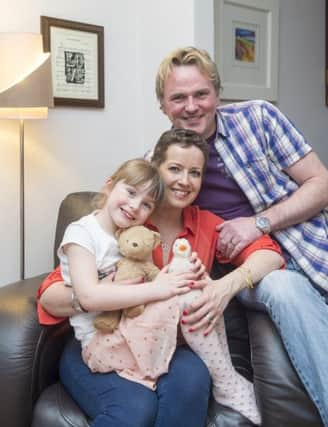Scotland's '˜outdated' cancer care system needs help


The current system is not fit to help cancer patients cope with the array of emotional, financial and physical problems as there will be around 260,000 Scots with the disease by the next election, according to the charity Macmillan Cancer Support.
The figure is an increase of 40 per cent since 2010, when 190,000 people were living with cancer.
Advertisement
Hide AdAdvertisement
Hide AdThe charity is calling for an updated Scottish cancer plan ahead of the Scottish Parliament elections in May to ensure patients are not let down by the system.
Janice Preston, Macmillan’s head in Scotland, said: “Too many cancer patients are being let down by our outdated system.
“As more people are living longer after being diagnosed with cancer, there needs to be a complete transformation in how cancer patients are supported.
“Early detection and good treatment are vital, but it’s not good enough to treat the illness and fail to address what the person needs. Cancer doesn’t happen to a body part. It happens to a person.
“It often impacts on every aspect of life, causing problems from homelessness and debt to depression and mobility issues.
“These problems can last long after treatment ends.We believe cancer patients in Scotland deserve better than this and we are asking our political parties to show us that they agree by pledging support for our manifesto calls ahead of the May election.”
Ministers are committed to publishing a new cancer strategy later this spring, which is expected to include greater investment in services, according to the Scottish Government.
Last night, a spokesperson told The Scotsman: “A record number of people in Scotland are surviving after cancer because of quicker diagnosis due to more people getting checked earlier and advanced specialist treatment.
Advertisement
Hide AdAdvertisement
Hide Ad“However, facing cancer either yourself or with a loved one can be a very difficult time and people need a range of support, from financial advice to emotional support.
“That is why we continue to work closely with Macmillan Cancer Support and other stakeholders to improve the range of advice and support available to people living with cancer.
“Our £450,000 investment in Macmillan’s financial support services during 2014-15 has enabled over 7,500 people with cancer to receive support worth £16.9 million.
“The partnership Transforming Care After Treatment programme also offers support and enables cancer survivors to live as healthy a life as possible for as long as possible.”
Susan Selkirk learned the unexpected impact cancer can have as she struggled with feelings of guilt after her breast cancer diagnosis.
The 40-year-old had taken then three-year-old daughter Charlotte to the doctor last year when she made the snap decision to get a lump in her breast checked out.
Ms Selkirk, of Newton Mearns, East Renfrewshire, said: “I got great information about treatments I was going to go through and side effects of the medication I was going to be given.
“But I didn’t know about the wider impact cancer would have or the long-lasting side effects, such as ‘chemo brain’.
Advertisement
Hide AdAdvertisement
Hide Ad“I lose my words mid-sentence. I lose my train of thought. I can’t stand lots of noise. If Charlotte and my husband Neil are talking to me and the radio is on, by the time they all leave in the morning I feel I need to sit down and go back to bed.”
Ms Selkirk, who worked previously as a fundraising manager for Macmillan, said: “I feel a huge amount of guilt, which is a weird emotion to have, I felt guilty about being ill, putting Neil and Mum through watching me being ill.
“During treatment it was hard being away from my family so much. I was in hospital for weeks at a time and I nearly missed Charlotte’s fourth birthday
“After my treatment finished came the worry that it will come back again – I worry about what impact a second diagnosis would have on the close family.”
